- TOP
- Search Criteria
- From Rock Bottom to Manga Artist: an Interview with Misako Rocks!

STORY
From Rock Bottom to Manga Artist: an Interview with Misako Rocks!
Faced with situations that would have most people throwing in the towel and giving up, Misako Rocks preserved. Now she is a successful manga artist and public speaker who travels back and forth between New York City and Japan. My colleague Yuko Tsuruoka and I caught up with Misako during one of her trips to Tokyo. I listened as Yuko asked Misako about her life, the secrets behind her courage and perseverance, and about what she thinks of the “Cool Japan” campaign.
Misako: This time it’s been about three months since I was last in Japan. Last year I made the trip four times, so I feel like I travel back and forth pretty frequently. But because I live in New York most of the time and I’m used to how things work over there, there are sometimes when I’m just like, “Japan is amazing.” Like how no one just throws garbage on the street, and how clean the cities are. The way everyone obeys the rules. Also, compared to New York, Japan is a really safe, clean place. That’s probably a given for most Japanese people, but coming at it from an outside perspective it’s really incredible.
Recently, though, when I come back to Japan, I feel like the country is changing a little. For some reason, I get the sense that Japanese people are starting to close their hearts. Like when I get on the subway in Tokyo-- and this is probably normal for Japanese people-- but everyone is on their smartphones! I was really surprised. Before there were always some people on their cell phones or reading a book, but now you can pretty safely say that everyone is on their smartphones. People are so into their phones now that they don’t notice if an elderly person needs their seat, or when they bump into someone, they don’t apologize. I feel like there are more and more people like that. Smartphones are great, but I still felt kind of disappointed by that kind of scene.
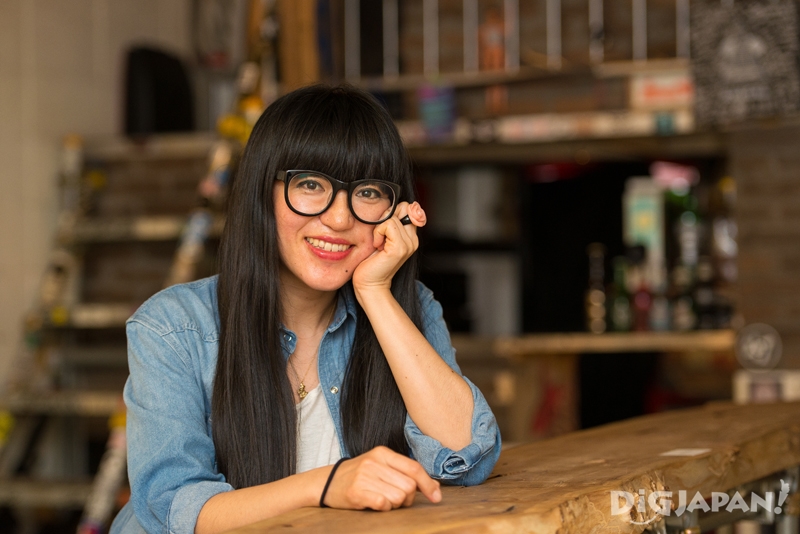
Yuko: I see. Are there any other differences you notice between New York and Japan?
Misako: I get a little bit of a strange feeling from customer service in Japanese stores. For example, when I go to a chain coffee shop in Japan, the staff are all extremely polite, always smiling. You can go to the same chain anywhere in Japan and the service is pretty much the same. Even if the customer is a kid, the staff is super polite. To Japanese people this level of service is expected so it feels comfortable, but to me it kind of seems robotic.
At first glance, this politeness and these friendly smiles can be called good service, but I feel like it might be nice to see a little more of the personality of those who work in the service industry. No matter how good the customer service is, if it’s always the same wherever you go, you start to get the feeling that none of it is genuine. Japanese companies are well-known for their detailed operation manuals and accurate operations, but I feel like we could use this as a base and add a little more diversity. That way, we’d create the kind of service industry that no other country could copy.
Yuko: You’ve been chosen as the representative “Japanese woman who lives in New York” and even been invited to a social gathering hosted by the wife of the Prime Minister of Japan in that capacity. Tell me, what was it that made you want to go to the U.S.?
Misako: I saw the movie “Back to the Future” when I was a kid and fell in love with Michael J. Fox at first sight. From that point on, I loved America. My grades in middle school were really bad, but I decided that I was going to study abroad in America. I got Michael’s movies and watched them without subtitles to practice English. When I got to college, I was finally able to study abroad in the U.S., but I ended up in this really rural place in Missouri. It was nothing like the “American life” I’d been dreaming about. I faced racism and couldn’t communicate well with others. The difference between the kind of study abroad experience I’d been expecting and what I was actually experiencing was pretty heartbreaking for me. One thing I learned during that time is that to Americans, Asian people aren’t very expressive when they talk, so it’s hard for them to know what they’re thinking.
Once I knew that, I distanced myself from the other Japanese students studying abroad. I dyed my hair different colors like red or pink to make myself stand out. When it seems like you’re about to be swallowed up by a group, it’s really important to make yourself stand out. I was also influenced by how Americans firmly stated their opinions. I started asking Americans questions and being the one to start conversations with them because of that. When I did this, I started to get more American friends and fell in love with America even more.
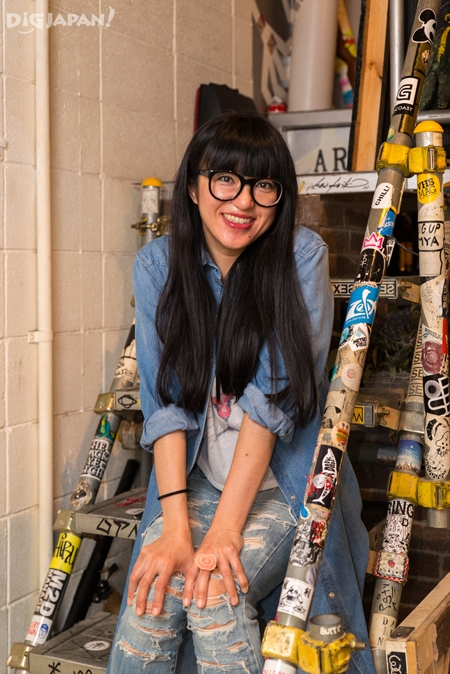
Yuko: Normally when Japanese students return from studying abroad, they focus on finding a job. But you wanted to go back to America. Did your parents oppose this?
Misako: They did. Both my parents were civil servants and my household was really strict. But I was determined to live in America, so I applied for an internship at a New York theatre company that I found online. I somehow managed to get a visa and went back to the States. I really wanted to be a puppeteer for The Lion King at the time, so I worked really hard at my performing arts job, but unfortunately I wasn’t able to do it for long. The job didn’t pay well, and I stopped being able to believe in myself. That was my first failure.
After that there was 9/11 and New York went into a panic. Probably as a result of that, the landlord of the place where I’d been living threw me out all of a sudden. After that, I went through a period of homelessness. I was living in a park with absolutely no money, looking through trash cans to see if there was something I could eat... Around that time, I met a really handsome American guy. We got married in Japan because my visa was about to expire. Then we moved to Wisconsin to settle. But that “international married life” that I’d really wanted didn’t last long, either. Both my work life and personal life weren’t going well. I started taking sleeping pills and tranquilizers for a while to deal with the stress, but both my physical and mental condition were in tatters.
Yuko: After hitting rock bottom, you decided to be a manga artist, right? What made you decide to pick up the pen?
Misako: I was working seven part time jobs in Wisconsin at the time. One of those was working reception at a children’s art museum. One day an American kid walked up to me with a copy of Dragonball and said, “You’re Japanese, right? Do you know this manga?” I asked him, “Where did you get a manga?” and he said, “There are tons of them in the library.” So I went to the library and saw that they really did have tons of both American comics and Japanese manga, and all of a sudden I thought to myself, this is it! At that time, it was all but certain my disastrous marriage could only end in divorce and I was in a pretty dark place, but manga was like a thin ray of light that came in. I thought, if I make an Asian character whose life is hard like mine, it’ll probably be a hit.
Of course I’d never drawn manga up to that point, so I started practicing by myself. I started changing my designs and story in ways that I thought would make them more appealing to an American audience. After that, I took my work to lots of different publishers and finally found one that would publish it. Once I found my path, I trusted my instincts and pursued it passionately. Up till that pointed I had failed so many times, but I think that I was able to find this chance exactly because I’d hit rock bottom.
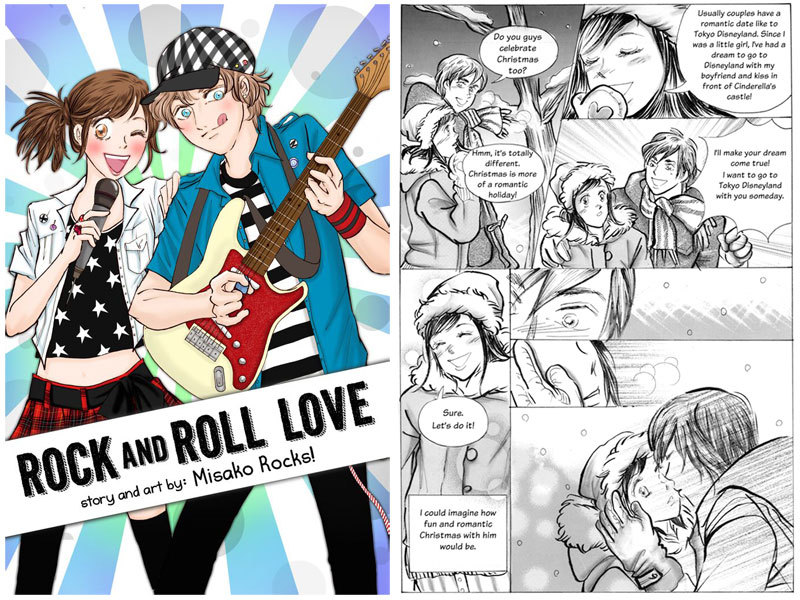
One of the other things I did in order to be a successful manga artist was to change my appearance. The competition in New York is really fierce. In order to make it, you have to have a strong personality. I grew out my hair, left it its natural color (black), and got glasses with thick black rims. In New York, I wanted to bill myself as both a “Japanese girl” and a character who looked like she’d come out of a manga. This became the trademark look for “Misako Rocks,” and I used my character to help advance the success of my manga. No matter how good your work is, if you can’t get it published and you can’t get publicity, then bookstores aren’t going to sell it and people aren’t going to read it. That’s why you also need to market yourself assertively.
Yuko: In addition to being a manga artist, you also work as a motivational speaker. That’s a kind of job we don’t often hear about in Japan. What kind of things do you do?
Misako: In America, motivational speakers often go to schools. A lot of them talk about the difficulties they’ve faced in their own lives, or how they were able to turn their lives around. They share their stories to help motivate students to have more courage, to take risks, and things like that. I talk about how I was able to overcome all the problems and obstacles I encountered while going to school and working in America and, as a Japanese person living in America, how I didn’t “lose” to the Americans around me. I also use a slide show as I talk. America is a very culturally diverse country, so these kinds of cross-cultural topics are very well-received, and I get invited to schools and colleges. I’ve had the opportunity to lecture at the Metropolitan Museum of Art and Princeton University and teach a manga drawing class at both places. Both events went very well.
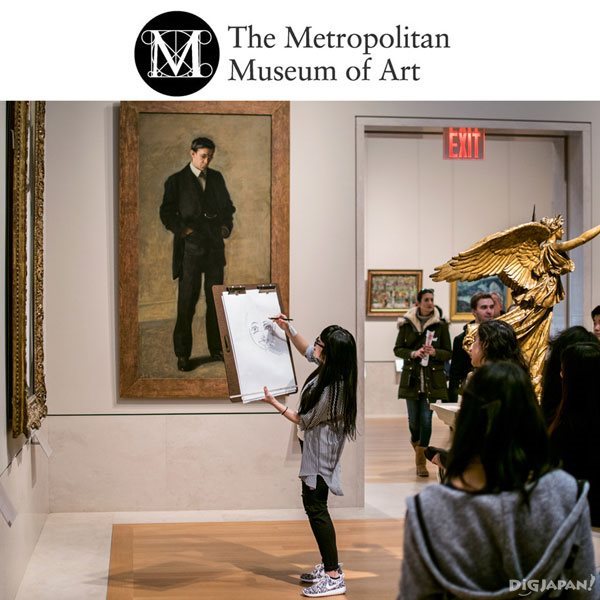
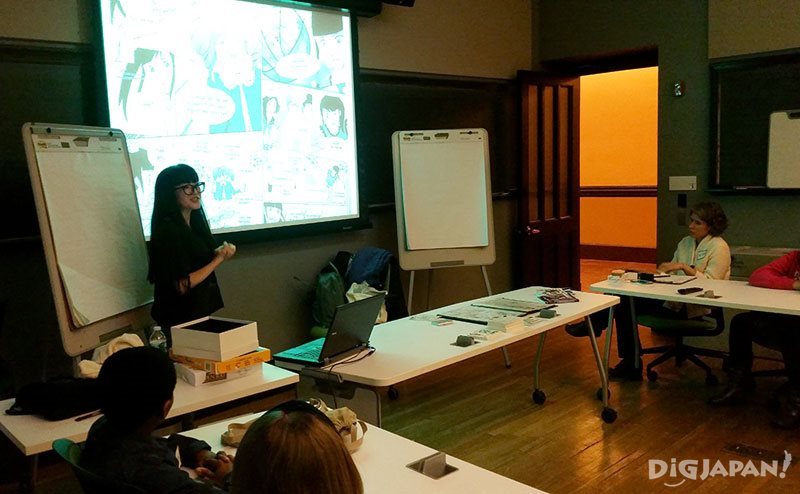
Yuko: You have gone through almost impossible experiences. Where did you find the strength to keep going?
Misako: One of the reasons why I have all this courage and take all these risks is that when I was seventeen, a childhood friend of mine suddenly passed away. This was a kid who’d always been right in front of me until, suddenly, one day they were gone. It was a shock. Now I’m grateful for just being alive everyday, and if there’s something I want to try, I do it.
Later, after I had gone to America, my cousin died in an accident at the age of forty. Even though Japan is really far away from America, my relatives supported me through this time. I was incredibly happy for that. Also, I decided that I was going to do my best and challenge myself enough for the both of us. His death became one of my reasons for trying so hard. My sadness turned into energy, like a force pushing me forward. Losing someone close to me at a young age made me realize that tomorrow isn’t guaranteed to come, and that even if I’m not sure what I’m doing, I should try. That it’s better to try than to live with regret. These experiences made me the kind of Misako Rocks I am today.
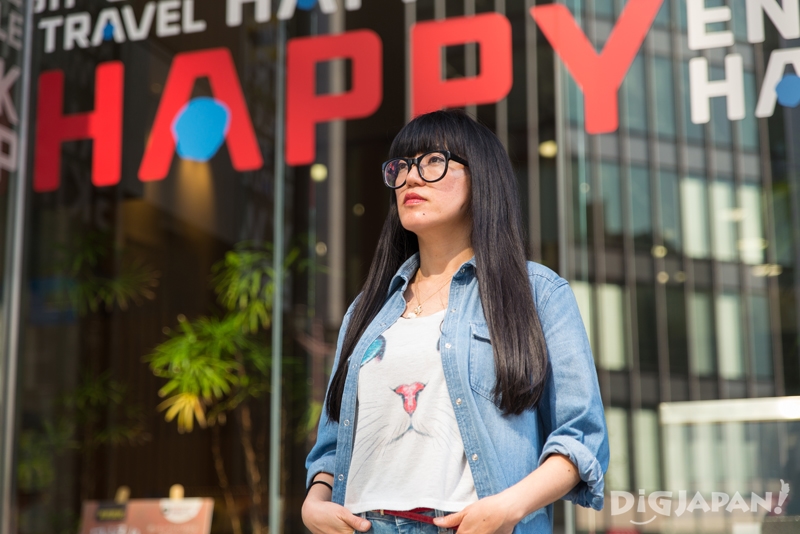
Yuko: Are there any techniques for staying positive during difficult times?
Misako: I was bullied for a year when I was in elementary school. I realized that if the people immediately around me weren’t going to accept me, then I needed to look for someone who would. That was really important. In the end, no one can handle everything on their own. You need a mentor or friend who can support you, who can tell you that you can do it while pushing you forward. Even if you can't find a solution to your problem, just having someone you can talk with about that problem is very important.
Even now when I go to New York, there are some times when I feel so small. I feel like I’m not really achieving anything. And then I go and meet with my friends, and I realize that all these amazing people have the same fears and doubts that I do, that I’m not the only one who feels down sometimes. That’s why I feel like it’s good to have someone who you can talk to openly about your problems.
Yuko: What do you think about “Cool Japan?” Do people in New York think Japan is cool?
Misako: Maybe people used to think it was cool? I mean, Japanese electronics have done really well. I think if you had to name Japan’s image abroad, maybe it would be something like “Peaceful Japan?” I don’t think Japan has as much a futuristic image as it did in the past. And things like anime and manga aren’t considered cool by everyone. Everyone has their own tastes and preferences, so we’d probably be suspicious if someone tried to decide that Japan is definitively cool.
Right now, Japan’s omotenashi culture is being recognized again in Japan, but I get the sense that, to foreigners, that level of service and politeness is kind of over the top. If you look at it from the perspective of people from Western countries, they’re happy with just the necessary level of service. They want to do things they can do for themselves. If they need more help, then they’ll ask.
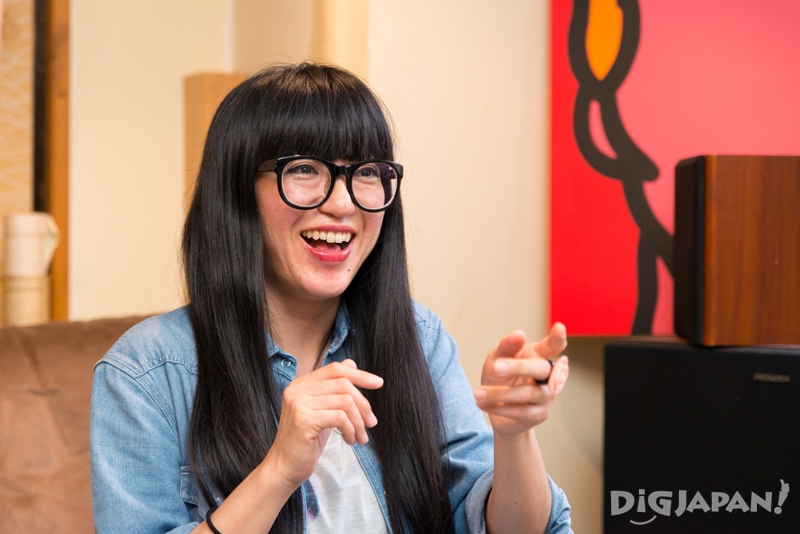
Yuko: What do you think Japan could do to make itself more appealing?
Misako: I think that most Americans think everyday things in Japan are cool. Like oshibori (note: damp towels used for wiping hands) in restaurants. Those things awesome! Go to a cafe or bakery, and you’ll get an oshibori or moist towelette, right? And then there’s how bakeries wrap up individual pieces of bread one by one. I think that kind of attentiveness is really great. Then there are bento boxes. Those are super popular. The bento boxes, the little plastic dividers and cups, all of those are really cute. Then you wrap the whole thing up with a cloth. I think American teenagers would be really into them. After all, Americans are used to “brown-bagging” it, throwing a sandwich and an apple into a ziplock.
Zabuton (note: floor cushions) are great, too. I think foreign visitors want to experience a Japanese way of living, like sitting on tatami mats with zabuton. Things like “samurai” cultural experiences are nice, too, but it’s not like we have samurai in Japan anymore, right? One more thing that non-Japanese people like are those clear plastic umbrellas. In the U.S., most people won’t use an umbrella if it’s just raining a little, but if they do use an umbrella, it’s usually a black one. People first learned about the clear plastic ones in Japan from the movie Lost in Translation. When I use one of those back in the states, people always ask me where I got it.
Americans are most into the things that Japanese people use in their everyday lives. I think Americans find those everyday things in Japan interesting enough, and that they’re more interested in seeing what life is really like in Japan. It kind of seems to me that Japan is going a little overboard trying to appeal to foreigners, you know? I think Japan should just take a breath and be itself. After all, Americans who are coming to Japan are coming because they like Japan, and they want to see the real Japan. Everyone should just relax and show them how great Japan naturally is.
Yuko: What kind of thing do you want to try next?
Misako: I want to be a kind of go-between for America and Japan. I know the latest information from New York, and I understand Japanese culture. As I go back and forth, I want to help spread information.
Also, I want to create “life education.” In English, there are these terms “book smart” and “street smart.” I am definitely a street smart person. This isn’t something I got from studying at university, but it’s the skill I acquired to live with all different kinds of people while pursuing my goals. I think I’d like to coach people who want to use life skills like these in our increasingly international society. I’m planning on asking my alma mater to let me lecture about the subject.
Yuko: Lastly, do you have a message for our readers?
To anyone who wants to get out there and do something abroad, don’t be reserved! In places like New York that are meritocracies, don’t worry about fitting in completely. Japan has this saying-- the nail that sticks up gets hammered down, meaning that it’s not good to stand out. But I say be the nail that keeps sticking out, and stick out higher and higher! There’s no need to be embarrassed. You’ll be surprised at the things you can do!
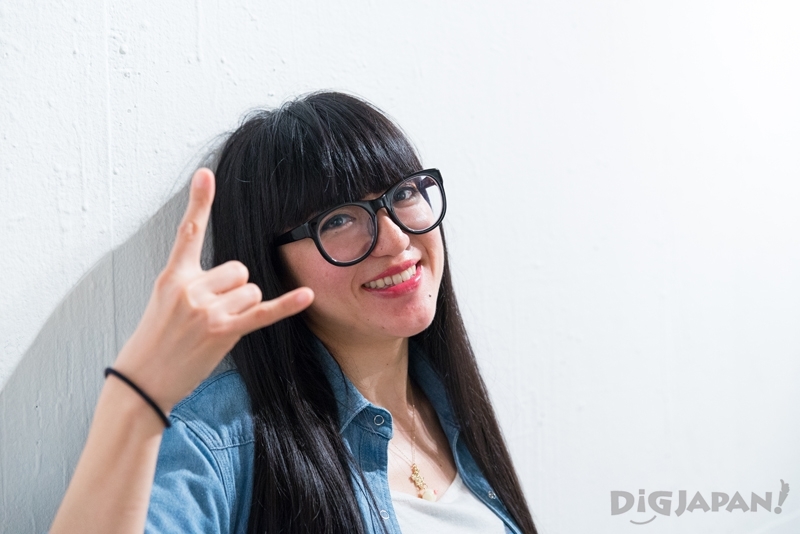
MISAKO ROCKS | ミサコ・ロックス
Misako Rocks is a manga artist and motivational speaker who resides in New York City. While publishing comics and essays in both Japan and New York, she gives presentations and workshops at schools across the U.S. as well as at institutions such as Colombia University and the Metropolitan Museum of Art.
2010: named Nikkei Woman's "Woman of the Year" in the Career Create category
September 2013: participated in a small informal gathering with the Prime Minister's wife
Published Works
Rock and Roll Love; Detective Jermain; Riyutoka Mokutekitoka Nandatteiijan! Charenji Shinakucha Kokai mo Dekinai!; Mou Gaijin ni Shimashita; and more.
Misako Rock's Blog (Japanese)
http://ameblo.jp/misakorocks/
Misako Rock's Offical Website
http://www.misakorocks.com
Misako Rocks! on Instagram
Instagram/@misakorocks
Misako Rocks! on Facebook
Facebook/misakorocks
Misako Rocks! on Twitter
Twitter/MisakoRocks
On traveling back and forth between New York and Japan
Yuko: You spend most of your time living in Brooklyn, New York. How does it feel when you come back to Japan after a while?
Misako: This time it’s been about three months since I was last in Japan. Last year I made the trip four times, so I feel like I travel back and forth pretty frequently. But because I live in New York most of the time and I’m used to how things work over there, there are sometimes when I’m just like, “Japan is amazing.” Like how no one just throws garbage on the street, and how clean the cities are. The way everyone obeys the rules. Also, compared to New York, Japan is a really safe, clean place. That’s probably a given for most Japanese people, but coming at it from an outside perspective it’s really incredible.
Recently, though, when I come back to Japan, I feel like the country is changing a little. For some reason, I get the sense that Japanese people are starting to close their hearts. Like when I get on the subway in Tokyo-- and this is probably normal for Japanese people-- but everyone is on their smartphones! I was really surprised. Before there were always some people on their cell phones or reading a book, but now you can pretty safely say that everyone is on their smartphones. People are so into their phones now that they don’t notice if an elderly person needs their seat, or when they bump into someone, they don’t apologize. I feel like there are more and more people like that. Smartphones are great, but I still felt kind of disappointed by that kind of scene.

Yuko: I see. Are there any other differences you notice between New York and Japan?
Misako: I get a little bit of a strange feeling from customer service in Japanese stores. For example, when I go to a chain coffee shop in Japan, the staff are all extremely polite, always smiling. You can go to the same chain anywhere in Japan and the service is pretty much the same. Even if the customer is a kid, the staff is super polite. To Japanese people this level of service is expected so it feels comfortable, but to me it kind of seems robotic.
At first glance, this politeness and these friendly smiles can be called good service, but I feel like it might be nice to see a little more of the personality of those who work in the service industry. No matter how good the customer service is, if it’s always the same wherever you go, you start to get the feeling that none of it is genuine. Japanese companies are well-known for their detailed operation manuals and accurate operations, but I feel like we could use this as a base and add a little more diversity. That way, we’d create the kind of service industry that no other country could copy.
On going to the United States
Yuko: You’ve been chosen as the representative “Japanese woman who lives in New York” and even been invited to a social gathering hosted by the wife of the Prime Minister of Japan in that capacity. Tell me, what was it that made you want to go to the U.S.?
Misako: I saw the movie “Back to the Future” when I was a kid and fell in love with Michael J. Fox at first sight. From that point on, I loved America. My grades in middle school were really bad, but I decided that I was going to study abroad in America. I got Michael’s movies and watched them without subtitles to practice English. When I got to college, I was finally able to study abroad in the U.S., but I ended up in this really rural place in Missouri. It was nothing like the “American life” I’d been dreaming about. I faced racism and couldn’t communicate well with others. The difference between the kind of study abroad experience I’d been expecting and what I was actually experiencing was pretty heartbreaking for me. One thing I learned during that time is that to Americans, Asian people aren’t very expressive when they talk, so it’s hard for them to know what they’re thinking.
Once I knew that, I distanced myself from the other Japanese students studying abroad. I dyed my hair different colors like red or pink to make myself stand out. When it seems like you’re about to be swallowed up by a group, it’s really important to make yourself stand out. I was also influenced by how Americans firmly stated their opinions. I started asking Americans questions and being the one to start conversations with them because of that. When I did this, I started to get more American friends and fell in love with America even more.

Yuko: Normally when Japanese students return from studying abroad, they focus on finding a job. But you wanted to go back to America. Did your parents oppose this?
Misako: They did. Both my parents were civil servants and my household was really strict. But I was determined to live in America, so I applied for an internship at a New York theatre company that I found online. I somehow managed to get a visa and went back to the States. I really wanted to be a puppeteer for The Lion King at the time, so I worked really hard at my performing arts job, but unfortunately I wasn’t able to do it for long. The job didn’t pay well, and I stopped being able to believe in myself. That was my first failure.
After that there was 9/11 and New York went into a panic. Probably as a result of that, the landlord of the place where I’d been living threw me out all of a sudden. After that, I went through a period of homelessness. I was living in a park with absolutely no money, looking through trash cans to see if there was something I could eat... Around that time, I met a really handsome American guy. We got married in Japan because my visa was about to expire. Then we moved to Wisconsin to settle. But that “international married life” that I’d really wanted didn’t last long, either. Both my work life and personal life weren’t going well. I started taking sleeping pills and tranquilizers for a while to deal with the stress, but both my physical and mental condition were in tatters.
On going from rock bottom to being a manga artist
Yuko: After hitting rock bottom, you decided to be a manga artist, right? What made you decide to pick up the pen?
Misako: I was working seven part time jobs in Wisconsin at the time. One of those was working reception at a children’s art museum. One day an American kid walked up to me with a copy of Dragonball and said, “You’re Japanese, right? Do you know this manga?” I asked him, “Where did you get a manga?” and he said, “There are tons of them in the library.” So I went to the library and saw that they really did have tons of both American comics and Japanese manga, and all of a sudden I thought to myself, this is it! At that time, it was all but certain my disastrous marriage could only end in divorce and I was in a pretty dark place, but manga was like a thin ray of light that came in. I thought, if I make an Asian character whose life is hard like mine, it’ll probably be a hit.
Of course I’d never drawn manga up to that point, so I started practicing by myself. I started changing my designs and story in ways that I thought would make them more appealing to an American audience. After that, I took my work to lots of different publishers and finally found one that would publish it. Once I found my path, I trusted my instincts and pursued it passionately. Up till that pointed I had failed so many times, but I think that I was able to find this chance exactly because I’d hit rock bottom.

From Misako Rocks' autobiographical manga Rock and Roll Love
One of the other things I did in order to be a successful manga artist was to change my appearance. The competition in New York is really fierce. In order to make it, you have to have a strong personality. I grew out my hair, left it its natural color (black), and got glasses with thick black rims. In New York, I wanted to bill myself as both a “Japanese girl” and a character who looked like she’d come out of a manga. This became the trademark look for “Misako Rocks,” and I used my character to help advance the success of my manga. No matter how good your work is, if you can’t get it published and you can’t get publicity, then bookstores aren’t going to sell it and people aren’t going to read it. That’s why you also need to market yourself assertively.
On being a motivational speaker
Yuko: In addition to being a manga artist, you also work as a motivational speaker. That’s a kind of job we don’t often hear about in Japan. What kind of things do you do?
Misako: In America, motivational speakers often go to schools. A lot of them talk about the difficulties they’ve faced in their own lives, or how they were able to turn their lives around. They share their stories to help motivate students to have more courage, to take risks, and things like that. I talk about how I was able to overcome all the problems and obstacles I encountered while going to school and working in America and, as a Japanese person living in America, how I didn’t “lose” to the Americans around me. I also use a slide show as I talk. America is a very culturally diverse country, so these kinds of cross-cultural topics are very well-received, and I get invited to schools and colleges. I’ve had the opportunity to lecture at the Metropolitan Museum of Art and Princeton University and teach a manga drawing class at both places. Both events went very well.

Misako at the Metropolitan Museum of Art

Misako at Princeton University
On the source of her strength
Yuko: You have gone through almost impossible experiences. Where did you find the strength to keep going?
Misako: One of the reasons why I have all this courage and take all these risks is that when I was seventeen, a childhood friend of mine suddenly passed away. This was a kid who’d always been right in front of me until, suddenly, one day they were gone. It was a shock. Now I’m grateful for just being alive everyday, and if there’s something I want to try, I do it.
Later, after I had gone to America, my cousin died in an accident at the age of forty. Even though Japan is really far away from America, my relatives supported me through this time. I was incredibly happy for that. Also, I decided that I was going to do my best and challenge myself enough for the both of us. His death became one of my reasons for trying so hard. My sadness turned into energy, like a force pushing me forward. Losing someone close to me at a young age made me realize that tomorrow isn’t guaranteed to come, and that even if I’m not sure what I’m doing, I should try. That it’s better to try than to live with regret. These experiences made me the kind of Misako Rocks I am today.

Yuko: Are there any techniques for staying positive during difficult times?
Misako: I was bullied for a year when I was in elementary school. I realized that if the people immediately around me weren’t going to accept me, then I needed to look for someone who would. That was really important. In the end, no one can handle everything on their own. You need a mentor or friend who can support you, who can tell you that you can do it while pushing you forward. Even if you can't find a solution to your problem, just having someone you can talk with about that problem is very important.
Even now when I go to New York, there are some times when I feel so small. I feel like I’m not really achieving anything. And then I go and meet with my friends, and I realize that all these amazing people have the same fears and doubts that I do, that I’m not the only one who feels down sometimes. That’s why I feel like it’s good to have someone who you can talk to openly about your problems.
On "Cool Japan"
Yuko: What do you think about “Cool Japan?” Do people in New York think Japan is cool?
Misako: Maybe people used to think it was cool? I mean, Japanese electronics have done really well. I think if you had to name Japan’s image abroad, maybe it would be something like “Peaceful Japan?” I don’t think Japan has as much a futuristic image as it did in the past. And things like anime and manga aren’t considered cool by everyone. Everyone has their own tastes and preferences, so we’d probably be suspicious if someone tried to decide that Japan is definitively cool.
Right now, Japan’s omotenashi culture is being recognized again in Japan, but I get the sense that, to foreigners, that level of service and politeness is kind of over the top. If you look at it from the perspective of people from Western countries, they’re happy with just the necessary level of service. They want to do things they can do for themselves. If they need more help, then they’ll ask.

Yuko: What do you think Japan could do to make itself more appealing?
Misako: I think that most Americans think everyday things in Japan are cool. Like oshibori (note: damp towels used for wiping hands) in restaurants. Those things awesome! Go to a cafe or bakery, and you’ll get an oshibori or moist towelette, right? And then there’s how bakeries wrap up individual pieces of bread one by one. I think that kind of attentiveness is really great. Then there are bento boxes. Those are super popular. The bento boxes, the little plastic dividers and cups, all of those are really cute. Then you wrap the whole thing up with a cloth. I think American teenagers would be really into them. After all, Americans are used to “brown-bagging” it, throwing a sandwich and an apple into a ziplock.
Zabuton (note: floor cushions) are great, too. I think foreign visitors want to experience a Japanese way of living, like sitting on tatami mats with zabuton. Things like “samurai” cultural experiences are nice, too, but it’s not like we have samurai in Japan anymore, right? One more thing that non-Japanese people like are those clear plastic umbrellas. In the U.S., most people won’t use an umbrella if it’s just raining a little, but if they do use an umbrella, it’s usually a black one. People first learned about the clear plastic ones in Japan from the movie Lost in Translation. When I use one of those back in the states, people always ask me where I got it.
Americans are most into the things that Japanese people use in their everyday lives. I think Americans find those everyday things in Japan interesting enough, and that they’re more interested in seeing what life is really like in Japan. It kind of seems to me that Japan is going a little overboard trying to appeal to foreigners, you know? I think Japan should just take a breath and be itself. After all, Americans who are coming to Japan are coming because they like Japan, and they want to see the real Japan. Everyone should just relax and show them how great Japan naturally is.
On the benefits of “street smarts”
Yuko: What kind of thing do you want to try next?
Misako: I want to be a kind of go-between for America and Japan. I know the latest information from New York, and I understand Japanese culture. As I go back and forth, I want to help spread information.
Also, I want to create “life education.” In English, there are these terms “book smart” and “street smart.” I am definitely a street smart person. This isn’t something I got from studying at university, but it’s the skill I acquired to live with all different kinds of people while pursuing my goals. I think I’d like to coach people who want to use life skills like these in our increasingly international society. I’m planning on asking my alma mater to let me lecture about the subject.
Yuko: Lastly, do you have a message for our readers?
To anyone who wants to get out there and do something abroad, don’t be reserved! In places like New York that are meritocracies, don’t worry about fitting in completely. Japan has this saying-- the nail that sticks up gets hammered down, meaning that it’s not good to stand out. But I say be the nail that keeps sticking out, and stick out higher and higher! There’s no need to be embarrassed. You’ll be surprised at the things you can do!

Profile
MISAKO ROCKS | ミサコ・ロックス
Misako Rocks is a manga artist and motivational speaker who resides in New York City. While publishing comics and essays in both Japan and New York, she gives presentations and workshops at schools across the U.S. as well as at institutions such as Colombia University and the Metropolitan Museum of Art.
2010: named Nikkei Woman's "Woman of the Year" in the Career Create category
September 2013: participated in a small informal gathering with the Prime Minister's wife
Published Works
Rock and Roll Love; Detective Jermain; Riyutoka Mokutekitoka Nandatteiijan! Charenji Shinakucha Kokai mo Dekinai!; Mou Gaijin ni Shimashita; and more.
Misako Rock's Blog (Japanese)
http://ameblo.jp/misakorocks/
Misako Rock's Offical Website
http://www.misakorocks.com
Misako Rocks! on Instagram
Instagram/@misakorocks
Misako Rocks! on Facebook
Facebook/misakorocks
Misako Rocks! on Twitter
Twitter/MisakoRocks

Liked this story? Like DiGJAPAN!
on Facebook for daily updates!
THIS ARTICLE IS BASED ON INFORMATION FROM 02 24,2017 Author:Rachael Ragalye













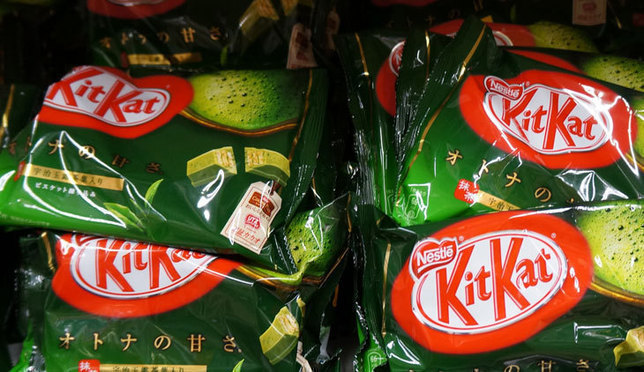
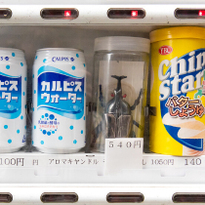
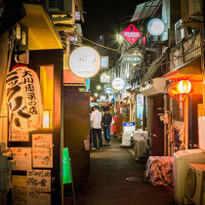
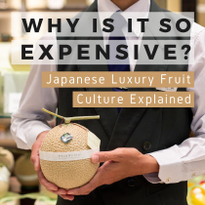
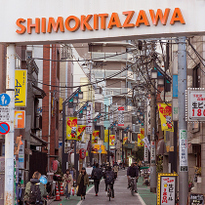




NEW COMMENT | 0 COMMENTS
Open a DiGJAPAN!
account to comment.
Open a DiGJAPAN! Account